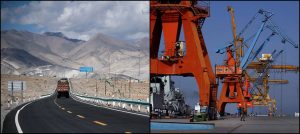Newspaper Article 07/10/2019

Pakistan and China bilateral relations established in May 1951, have progressed over the years. During the 1970s, Pakistan played the role of a facilitator in normalizing China-US relations. The US Secretary of State Henry Kissinger meeting with President Zhou Enlai in Beijing was facilitated by Pakistan, which later led to the visit of President Nixon to China. These developments showed the mushrooming of trust between Pakistan and China. Pakistan held significance in Beijing’s calculus and was seen by the US as a potential player in melting the ice between the US and China. Pakistan’s role as a facilitator opened up door for President Nixon’s visit to China.
The regional developments have not been able to impair the Pakistan-China bilateral relations. Rather, both the countries have continued with their ties, whether, it was the Cold war Or the war on terror. Also, the ideological differences, and religion have never been a point of concern between the two Asian countries. In the present scenario, China has become an economic power and has a political clout. But, the regional developments and the emerging power dynamics have set the stage for future cooperation. The China-Pakistan Economic Corridor (CPEC) often referred to as the “corridor of opportunities” is a bilateral initiative by Pakistan and China to promote trade cooperation and explore avenues of regional connectivity. In fact, CPEC is a practical manifestation of both countries strategic, geopolitical and socioeconomic interests. With the launching of CPEC, both Pakistan and China have step up efforts towards regional connectivity and trade. Gwadar seaport will offer route to adjoining regions / countries, thus opening up prospects of trade connectivity.
The corridor though a bilateral initiative foretells a commonality of interest between the two countries. China, in view of its economic growth might be looking for more avenues of trade cooperation, and stable political environment. For Pakistan, the corridor is a realization of the country’s geostrategic location. Thus, Pakistan and China’s lead efforts towards regional economic integration shows a commonality of purpose towards economic empowerment and building of a prosperous region. While, looking at the trends of regionalism in East Asia, South Asia and Central Asia, the East Asian economies are well-integrated. On the other hand, the countries of South Asia, and Central Asia have not been able to make worthwhile economic growth based on their resource potential. In this backdrop, Pakistan and China collective effort towards connectivity in the form of CPEC offers prospects of trade connectivity within and with outside world, and untapping of resource potential.
The economic activity associated with CPEC is an attraction for regional countries to connect economically. Whether economic interdependence will pool out a way towards regionalism and inter-regional connectivity or the political difference will outweigh the economic approach? In the prevailing political equation regionally, India has opposed CPEC, and has employed covert means to sabotage the development work in Balochistan. Pakistan and China convergence of interest over CPEC stems primarily from economic prowess. China through CPEC will broaden the trade links, while for Pakistan, the corridor and development of Gwadar seaport will transform the country into a regional trading hub. These developments place Pakistan and China on the same page in terms of regional connectivity, and aspiring of regional as well as global goals. However, the adversarial approach to reinforce insinuations of mistrust between the Chinese and Pakistani public. The perception that the corridor will entirely serve China’s purpose, and on CPEC related projects Chinese workers will have an edge over Pakistan workforce and industry is part of the simmering campaign to disrupt the corridor. Both Pakistan and China in order to realize their goal of economic ascendancy, and shared regional prosperity require a unanimous politico-strategic approach. In this regard, the need to have a peaceful political environment for operation of CPEC is a must.
A version of article appeared in Daily Times, September 26, 2019
[Disclaimer: The views expressed in the article are of the author and do not necessarily reflect the Institution’s policy]
